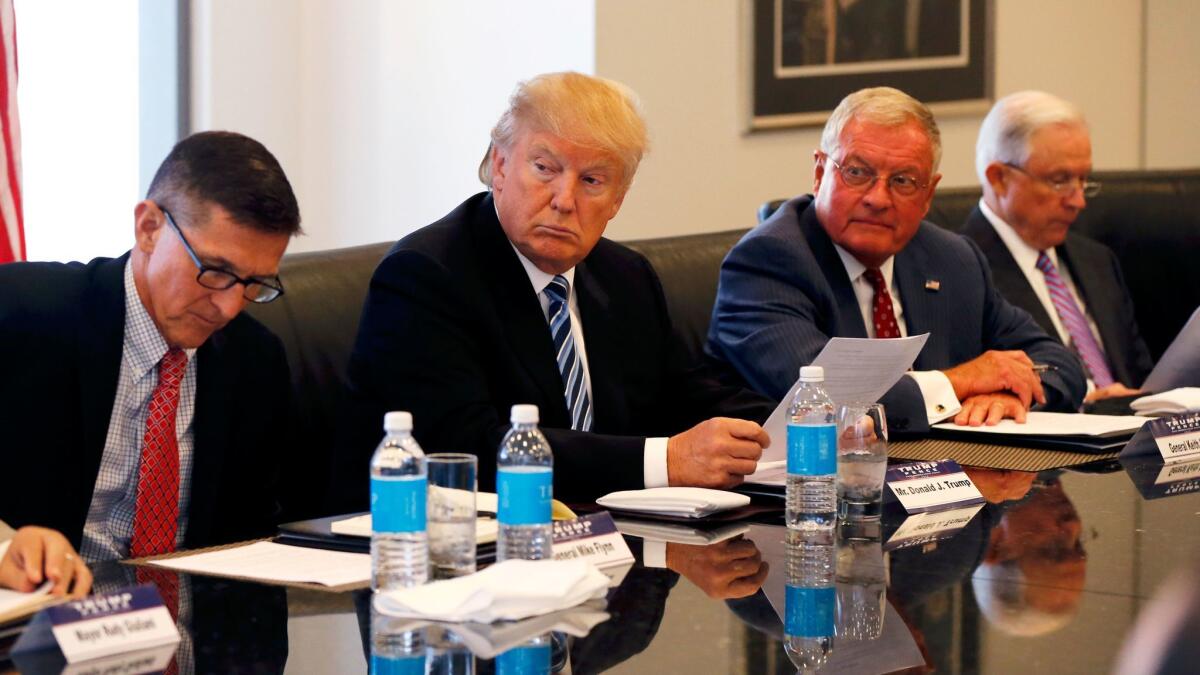Column: Tweeting through the apocalypse: Trump’s drive-by foreign policy

- Share via
“We must as a nation be more unpredictable,” Donald Trump said during the presidential campaign. “We have to be unpredictable!”
Mission accomplished. Last week, without warning, Trump announced what sounded like a U-turn in U.S. nuclear weapons policy.
“The United States must greatly strengthen and expand its nuclear capability until such time as the world comes to its senses regarding nukes,” the president-elect wrote on Twitter.
Expand the nuclear arsenal? Ever since Ronald Reagan, presidents have worked to reduce the number of warheads that the United States and Russia aim at each other. Trump aides swung into action, gamely arguing that when the boss said “expand,” he didn’t mean build more nukes. But a day later, Trump said he was ready to do just that. If Russia continues to modernize its nuclear force, he told television host Mika Brzezinski, “Let it be an arms race — because we will outmatch them at every pass.”
A drive-by foreign policy may unsettle potential adversaries like Russia and China ... but it unsettles real friends and potential allies too.
That wasn’t the only abrupt foreign policy move by a president-elect who won’t actually be on the job until Jan. 20.
Earlier this month, after another Twitterstorm, Trump told a television interviewer that he might reverse the 44-year-old “One China” policy under which the United States officially recognizes only one Chinese government (the one in Beijing).
Two weeks ago, he nominated a new ambassador to Israel who wants to abandon the long-standing U.S. goal of a peace treaty with a demilitarized Palestinian state, the two-state solution.
And during the campaign, he said he might not honor the U.S. treaty obligation to defend NATO allies if they don’t spend enough on defense.
Call it drive-by foreign policy, intended to take both adversaries and allies by surprise.
In some cases, these disruptive outbursts may be barely-disguised opening gambits in negotiations — ploys for the “better deals” Trump promised he would strike if he won.
For instance, Trump warned China that he’d reconsider the policy toward Taiwan unless Beijing offers the U.S. better terms on trade.
And Trump’s new spokesman, Sean Spicer, argued that the nuclear comments were part of a master plan too.
“There’s not going to be” an arms race, Spicer said, “because he’s going to ensure that other countries get the message that he’s not going to sit back and allow that…. They will come to their senses, and we will all be just fine.”
That benign interpretation doesn’t sound so bad. And it was significant that Trump directed his warning at Russian President Vladimir Putin, whom he has praised in the past as a strong leader. Perhaps Trump is just trying to keep the Kremlin on its toes?
In a broader sense, former Defense Secretary Robert M. Gates said last week, Trump’s seemingly slapdash assertiveness toward Putin may be a good thing.
“There is some value in a disruptive approach,” Gates told David Ignatius of the Washington Post. “I worry that if you don’t have pushback — let him know there are limits, and that the U.S. will react militarily, if necessary — then the chance of being taken advantage of is larger.” Gates added, though, that he wished Trump hadn’t used the word “expand” in his nuclear tweet. “Modernize” would have been better, he said. “There will be a rough break-in period,” he predicted, dryly.
That’s a problem.
A drive-by foreign policy may unsettle potential adversaries like Russia and China — this is an unpredictable and dangerous man, our frenemies are supposed to conclude, let’s be nice to him! But it unsettles real friends and potential allies too, who may draw a similar conclusion, and wonder how much confidence they should put in the United States.
Twitter, moreover, doesn’t provide much room for clarity. Trump’s nuclear tweet was explained — and re-explained — by three different aides. Each of them provided a slightly different interpretation of what their boss really meant.
More important, bluster and big demands may be great tactics in real estate negotiations — or even treaty negotiations. But they’re no substitute for a well-thought-out policy — and it’s not clear that Trump has one.
Former Secretary of State Henry A. Kissinger said recently that any new president must think hard about his goals, and then communicate them to the world.
“A president has an inescapable responsibility to provide direction,” Kissinger told The Atlantic. “What are we trying to achieve? What are we trying to prevent? Why? To do that, he has to both analyze and reflect.”
It’s not clear that Trump has done much of that.
Mr. President-elect, hardball tactics are fine. But you need a strategy first. Next time, please think — and explain — before you tweet.
Twitter: @DoyleMcManus
Follow the Opinion section on Twitter @latimesopinion and Facebook
ALSO
The scary truth about TSA’s PreCheck security vulnerabilities
Religious ‘neutrality’ is a myth. Let City Hall light up those Christmas trees, no menorah necessary
More to Read
A cure for the common opinion
Get thought-provoking perspectives with our weekly newsletter.
You may occasionally receive promotional content from the Los Angeles Times.











